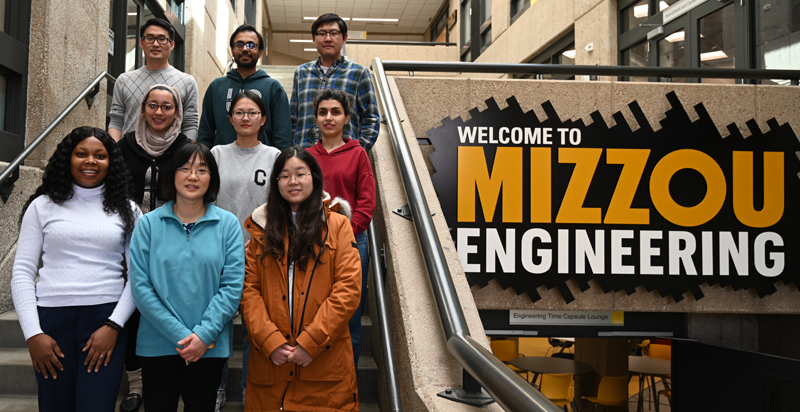April 07, 2024

Every day, billions of natural reactions happen all around us. Reactions in our bodies that enable us to function. Reactions in the air that form clouds. But the potential for harnessing these naturally occurring phenomenon for technological advancement has remained largely untapped.
That’s where Xiangqun Zeng comes in. A professor in the Department of Chemical and Biological Engineering as well as chemistry, Zeng joined Mizzou last year, bringing with her insatiable curiosity and an impressive portfolio of sponsored research.
“We develop next-generation sensors that mimic how the human sensory system works,” she said. “We want these sensors to be able to measure molecules continuously and in real time, similar to how we use our five senses. Our sensory system uses multiple interactions and reactions in a smart architecture, and we want to translate those into smart sensor devices.”
The through-line of her research is turning foundational understanding of the interface of biological and chemical interactions and reactions into tangible—and world-changing—innovations.
Take hydrogen, for instance. Hydrogen is a promising clean energy source however hydrogen is flammable and can be dangerous. In addition, hydrogen losses to the atmosphere impact the lifetime of other greenhouse gases, namely methane, ozone and water vapor, indirectly contributing to the increase of the Earth’s temperature in the near-term. While existing sensors can detect hydrogen in parts per million for hydrogen safety application, Zeng’s goal is to develop a sensor capable of detecting it at the unprecedented level of parts per billion. That technology is essential for the hydrogen production and hydrogen use in a wide array of applications such as hydrogen fuel cells, a renewable, greener form of energy.
Another project is the development of a device that can continuously monitor greenhouse gas emissions from Artic soil. By providing real-time big data on emissions patterns, such sensor can help researchers and policymakers better understand climate dynamics and devise more informed mitigation strategies.
Zeng applies the same scientific principles in the realm of health care. By leveraging insights from fundamental and applied research of chemical and biological reactions and processes, she is focused on medical sensor devices with innovative chemical/biointerfaces that can provide continuously monitoring of key biomarkers as well as more targeted, customized treatments.
“The reason I am here at Missouri is really because I have a lot of ideas and my creativity can be best utilized at max,” she said. “I’m so valued here, and I can really see tremendous potential for my work. There are a lot of opportunities for collaboration, and I’ve already reached out to colleagues across departments and colleges whose work complements. I’m excited to make more of an impact.”
Zeng’s work is supported by the National Institutes of Health, National Science Foundation, Department of Energy and private foundations. She holds more than 10 patents, has published more than 100 papers and six book chapters. Zeng was featured in the 2015 book, “Women who Changed the World: The Journey and the Joy.”
Be part of world-changing research. Learn more about the Department of Chemical and Biomedical Engineering at Mizzou.